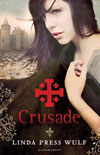13th century France is an unusual setting for a YA novel, and in some ways readers would be correct in assuming that the characters in Linda Press Wulf’s historical novel Crusade have very little in common with those of 21st century teenagers. From the age of nine, Georgette has worked as a housekeeper for the village priest; orphan boy Robert was raised in a monastery and educated by an esteemed Abbot. They don’t go to school, they don’t socialize, and they both have responsibilities way beyond those you’d expect of young people their age today. More than anything, it’s their religion that shapes their lives and the way they interpret the world. But as their individual stories collide, Crusade approaches the issue of religious fanaticism and intolerance in a way that is hugely relevant to modern society.
The novel sees Georgette and Robert leaving all they’ve ever known to join the crusade of a boy who calls himself a prophet; a charismatic young leader whose rousing words inspire them, alongside thousands of other children, to embark on a pilgrimage to the Holy Land. Drawing upon various historical accounts of a Children’s Crusade, Linda Press Wulf’s original tale reveals its subtle parallels with the kind of indoctrination that still contributes to religious extremism today. It’s the story of two characters navigating the strict teachings of the church and the prejudiced beliefs of their peers, and discovering what they themselves believe to be right and true.
Chiefly, Crusade is Georgette’s journey. Part coming-of-age story, part adventure, it’s packed with danger and conflict and inner turmoil for our heroine. Though Georgette’s innocence is perhaps her most striking characteristic, she also possesses a deceptive inner strength and determination. At a time when most regular people were illiterate and scholars were always male, her natural desire to learn also sets her apart. There’s a surprisingly passionate love story here too, as Georgette’s journey is mirrored by that of Robert, a scarred outsider with a remarkable intellect who has much to learn about the heart. The narrative voice, while third person, is so intimate that it’s easy to get inside both characters’ heads and see events as they do.
At under two hundred and fifty pages, this is a fairly brief read but also a rare and poignant one. Whilst the ending perhaps attempts to pack a little too much into a few short chapters, this doesn’t detract significantly from the overall experience. Rich in period detail and indredibly authentic in voice, it’s a book that takes distant legends of a Children’s Crusade and transforms them into something vital and powerful. Fans of historical fiction will no doubt be drawn to Crusade, but I’d also recommend it to anyone looking to immerse themselves in a beautifully drawn imagining of a world not often explored in YA fiction.
comment: … I really enjoyed Crusade! I agree about it being really poignant and I think that younger readers who normally wouldn’t read about the children’s crusades will find it easy to identify with characters their own age rather than reading it from a textbook.

